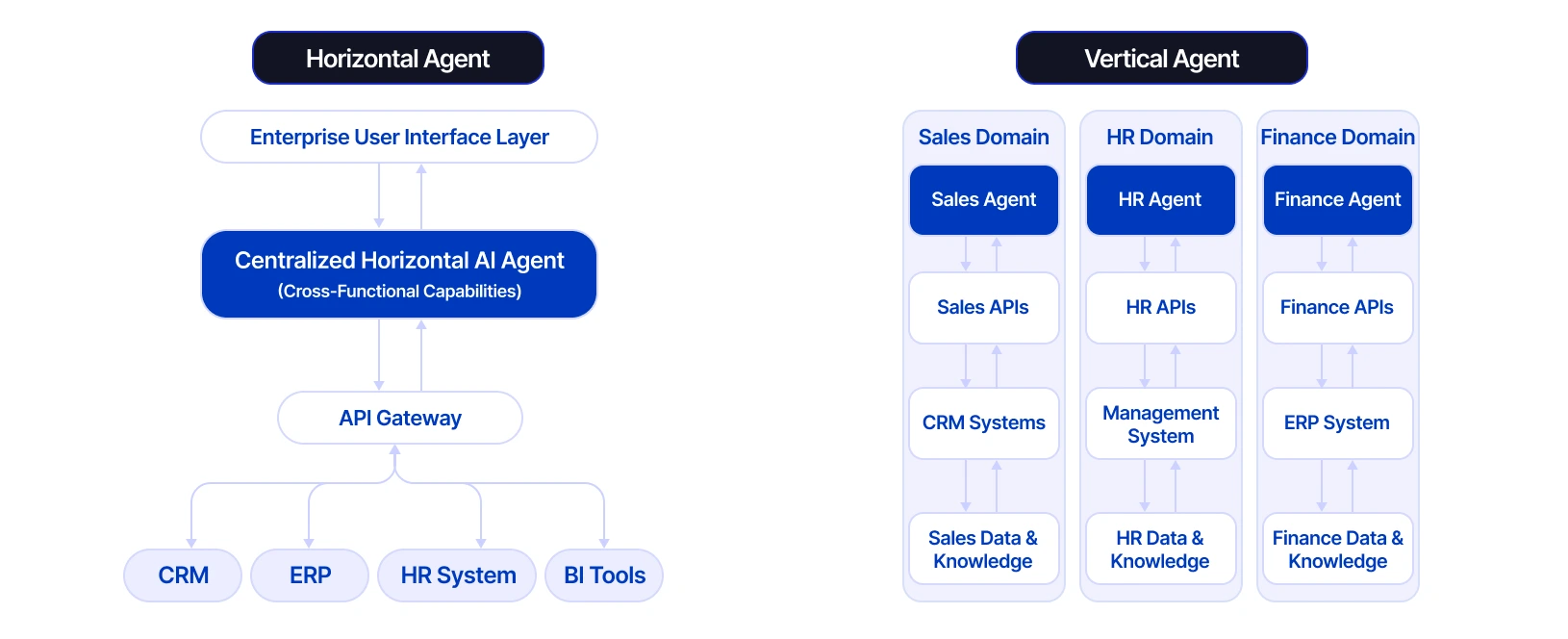The Rise of the Agent Economy: What You Need to Know
What if, instead of budgeting for human labor, businesses began to allocate funds for intelligent agents? As we enter the era of the agent economy, where autonomous AI agents handle everything from customer support to operations, the shift from traditional staffing, such as call center roles and administrative tasks, to intelligent, automated systems is no longer a distant idea. It’s quickly becoming a practical and scalable reality.
These agents, capable of handling a wide range of tasks with accuracy, are poised to disrupt industries and create entirely new business models. What we are witnessing isn’t just a technological upgrade; it’s the early signs of a fundamental shift in how businesses operate. As intelligent agents become more embedded in everyday workflows, the traditional structure of labor, cost, and productivity begins to change.
This is where the emerging “Agent Economy” comes into play. Where the line between human work and machine intelligence is increasingly blurred, and the way companies operate is set for a dramatic transformation. Let’s learn more!
From Apps to Agents: The Next Leap in Digital Workforces
Each wave of technological progress has reshaped how we build, buy, and do business.
The public cloud gave rise to the SaaS economy: software no longer came in a box, but lived online. The iPhone sparked the app economy: tools and services moved from desktops to our palms. Social media launched the creator economy, turning users into brands and content into currency.
Now, artificial intelligence is doing the same. But this time, the shift goes even deeper. We are moving from platforms to autonomous agents that don’t just enable experiences, but actively perform work.
Autonomous AI agents don’t just support users; they act on their behalf. They schedule meetings, respond to customers, write reports, manage operations, and more. These aren’t just new apps; they are digital workers who are capable of independently executing tasks that once required human labor.
While the conversation has largely focused on agent infrastructure and web integration, the true revolution lies in what agents can now accomplish. These agentic applications built on top of these agents aren’t just extensions of today’s tools; they are the foundation of an entirely new digital labor force: agent economy. This is an era where businesses will increasingly allocate their budgets to AI-powered agents, not human employees.
The Shift to the Agent Economy: From Labor to Agents
For decades, businesses have relied on human labor to power their operations. But now, with the rise of AI agents, a new era is unfolding. Rather than replacing human workers, intelligent agents are enhancing business capabilities and creating exciting new opportunities. Here’s what this transformation looks like:
1. Empowering businesses with scalable automation
Instead of merely expanding headcount, companies can now deploy intelligent agents that perform tasks efficiently and scale on demand. Consequently, this helps businesses grow without the traditional limitations of human workforce constraints.
2. 24/7 productivity and global reach
With AI agents, businesses can deliver services across time zones without interruption. These agents work tirelessly, providing continuous support, managing operations, and maintaining high-quality service 24/7.
3. Unlocking new possibilities for innovation
AI agents open the door to new business models, revenue streams, and services that were previously out of reach. They free up human employees to focus on strategic and creative tasks by handling routine work autonomously.
4. Seamless integration with human expertise
The future of work isn’t about replacing people; it’s about collaboration. AI agents complement human expertise by managing repetitive tasks, thus enabling employees to concentrate on more meaningful and high-impact activities.
5. Transforming industries and driving growth
In the Agent Economy, businesses can now think beyond traditional workforce models. With the right AI agents, companies can boost efficiency, improve customer experiences, and expand at unprecedented speeds.
This shift marks the beginning of a new digital workforce, one that integrates seamlessly with human talent and powers businesses to new heights. The Agent Economy isn’t just about automating tasks; it’s about creating a more dynamic, efficient, and innovative future for everyone.
AI Agents Are Rewriting SaaS and Labor – And Creating a 10x Bigger Market
As AI agents scale, they are not just enhancing workflows; they are opening the door to a new kind of market: one that’s projected to be over 10x larger than traditional SaaS.
SaaS changed how businesses accessed software, growing from a $143 billion market in 2021 to a projected $720 billion by 2028. But AI agents are redefining the model altogether. Instead of offering tools that users operate, agents act on their own; automating tasks like lead qualification, customer support, and document handling, often without human involvement.
Tapping into Labor Budgets and Unlocking Trillions in Value
This shift also taps into a far deeper budget pool. Labor budgets are 35 times larger than software budgets, and AI agents are positioned to draw from both. Rather than replacing humans outright, they complement teams by performing repetitive, high-volume tasks, thus allowing businesses to scale operations with fewer overhead constraints.
The scale of this shift is enormous. PwC projects that the global Agent Economy could generate $15.7 trillion annually by 2030, driven largely by smarter, more personalized, and cost-efficient services.
In fact, 45% of that impact will come from product enhancements, all of which is possible due to AI’s ability to tailor offerings and reduce production costs. The ripple effects will be global, with China expected to see a 26% GDP boost, and North America 14.5%, together accounting for nearly 70% of the total economic gains.
What Early Adoption Tells Us About the Future
From low-margin service sectors to high-growth tech, AI agents are turning traditional labor into intelligent and on-demand software. Consequently, reshaping business models and value creation in the process.
Early signs of this acceleration are already visible. Platforms like DeepSeek, an AI agent-powered tool, reached 1 million users in just 14 days and 10 million within 20 days, far outpacing the growth of early SaaS products like Dropbox. This kind of quick adoption signals how quickly the Agent Economy is gaining ground.
But as AI agents take on more autonomy, making decisions, executing tasks, and scaling across industries, the demand for trustworthy, auditable systems is rising just as fast. Businesses will need to ensure these agents are not only capable but also accountable and aligned with their goals, standards, and values. The future of the Agent Economy depends not just on what agents can do, but on how confidently we can rely on them to do it.
Mapping the Agent Economy: Where AI Agents Are Taking Hold
As copilots evolve into full-fledged AI agents, the Agent Economy is quickly taking shape across three core markets: horizontal, vertical, and consumer. Each layer presents a unique opportunity to reimagine work, not by replacing humans, but by redefining how intelligence is deployed at scale.

1. Horizontal Agents: Cross-Industry Workhorses
These are general-purpose agents designed to function across a wide range of industries. You can think of them as an infrastructure-grade intelligence – AI that plugs into common roles like sales, support, or development and enhances performance across sectors.
Examples: AI sales agents like Regie.ai, or smart bookkeepers such as Jenesys, are already enabling teams to work faster and smarter, regardless of the industry.
2. Vertical Agents: Experts in a Single Field
Here, AI is trained to solve deep and domain-specific challenges. This is built not for everyone, but for those who need accuracy. These agents act like in-house specialists: only faster, more scalable, and always on.
Examples: Tools like Harvey for legal and LinqAlpha for finance are transforming specialized roles by embedding intelligence directly into industry workflows.
3. Consumer: Intelligence in Your Pocket
The third frontier is the consumer world, where agents take on the roles of personal advisors, assistants, or service providers. From scheduling doctor appointments to negotiating bills, these agents aim to make everyday decisions easier and more accessible.
Examples: Services like Replika as an AI companion or ReAlpha as a real estate advisor show how AI is becoming embedded in daily life, often with no enterprise in sight.
What’s Ahead?
The agent economy is on the brink of transformative growth, with AI agents becoming central to a wide range of industries. As the AI tech market continues to expand its footprint, businesses that embrace these intelligent systems early will open up new opportunities and create competitive advantages.
As AI agents begin to take on more roles, from customer service to complex decision-making, companies will increasingly redirect their budgets from traditional human labor to smarter and more scalable AI solutions. This shift will not only increase operational efficiency but will also create entirely new revenue streams and business models.
So, the agent economy is no longer a distant possibility; it is already unfolding. The question isn’t if AI agents will redefine the future of business, but whether your organization is ready to lead or be left behind.
If you are ready to take the next step in shaping the future of your business with AI agents, explore our AI agent development expertise and discover how we can help you build smarter and scalable solutions for tomorrow’s economy.
Contact us for more information!

